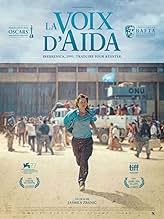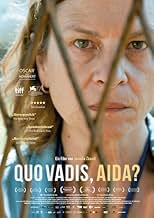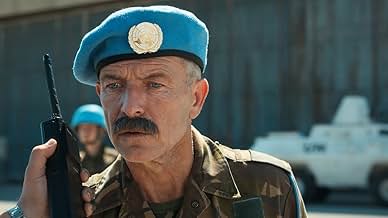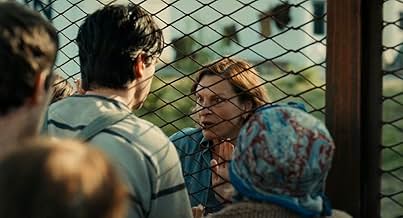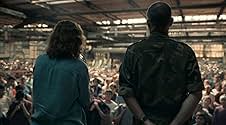VALUTAZIONE IMDb
8,0/10
40.842
LA TUA VALUTAZIONE
Aida è una traduttrice per le Nazioni Unite nella piccola città di Srebrenica. Quando l'esercito serbo prende il controllo della città, la sua famiglia è tra le migliaia di cittadini che cer... Leggi tuttoAida è una traduttrice per le Nazioni Unite nella piccola città di Srebrenica. Quando l'esercito serbo prende il controllo della città, la sua famiglia è tra le migliaia di cittadini che cercano rifugio nel campo delle Nazioni Unite.Aida è una traduttrice per le Nazioni Unite nella piccola città di Srebrenica. Quando l'esercito serbo prende il controllo della città, la sua famiglia è tra le migliaia di cittadini che cercano rifugio nel campo delle Nazioni Unite.
- Regia
- Sceneggiatura
- Star
- Candidato a 1 Oscar
- 40 vittorie e 42 candidature totali
Riepilogo
Reviewers say 'Quo Vadis, Aida?' is a powerful, harrowing film about the Srebrenica massacre, praised for impactful storytelling and strong performances, especially Jasna Duricic as Aida. It critically examines the United Nations' failure and explores themes of war and survival. While lauded for emotional depth and historical significance, some criticize perceived inaccuracies and over-dramatization. It is considered an important, though challenging, film that highlights a significant historical event.
Recensioni in evidenza
The Bosnian entry for the Best International Feature Academy Award, "Quo Vadis, Aida?" is better than the odds-on favorite to actually win the Oscar, "Druk" (a.ka. "Another Round," 2020), being that it's actually about something that matters and is emotionally devastating--so much so that the eponymous Aida literally begs to make a Sophie's Choice at one point. The protagonists in both are teachers, and neither one ultimately affects any real change, but one is living history while the other rambles to high-schoolers about his famous favorite fellow drunkards. Both pictures are alienating: this one forcing us to witness the horrific Srebrenica massacre that we're unable to alter, and the other makes one feel like the designated driver to a bunch of binge-drinking dolts whining about their so-called mid-life crises. As opposed to waiting impatiently to drive the inebriated teachers home, however, "Quo Vadis, Aida?" does well to pull the spectator into the chaos. There's nary a dull moment in following Aida (as played rivetingly well by Jasna Duricic--seriously, Academy, you missed a nominee) around a makeshift UN refugee camp as she frantically tries to save the lives of her husband and two sons from the approaching slaughter by Ratko Mladic's Bosnian Serb Army and as the United Nations and their so-called, shorts-wearing peace keepers impotently stand by and refuse to help.
I want to note, too, that Aida being a translator, or interpreter, as the case may be (that "piano player" as "messenger" part early on, e.g.), makes for an interesting dynamic in the subtitling of the picture, among other things--much of it disregarded as unnecessary because of it. There's actually a good deal of English here beside other languages. Another good reason for the Oscar category name change from "Foreign Language Film" to "International Feature."
Additionally, amid all that, writer-director Jasmila Zbanic and company also do something reflexively interesting cinematically. While the real war is nothing more than a one-sided genocide slaughtering Bosniak Muslim males, there's another battle here for the cinematic control of the narrative. On one side, there's Mladic with the cameraman he continually tells what to shoot, and who in return reassures the would-be convicted war criminal that he'll fix his inane monotony with montage. We never see that film here, though--only its making from the outside, where its propagandistic lies are all the more apparent. And, on the other side, we have the faces of the people in the outer, film proper that is "Quo Vadis, Aida?" We see this in intermittent series of return gazes--of people looking directly, or close to, at the camera and, thus, us, the audience. They're the victims of the genocide within the narrative and, as the case may be, interpreting the real tragedy onto the screen, but through these return gazes, seize control of the narrative. This is their movie.
I want to note, too, that Aida being a translator, or interpreter, as the case may be (that "piano player" as "messenger" part early on, e.g.), makes for an interesting dynamic in the subtitling of the picture, among other things--much of it disregarded as unnecessary because of it. There's actually a good deal of English here beside other languages. Another good reason for the Oscar category name change from "Foreign Language Film" to "International Feature."
Additionally, amid all that, writer-director Jasmila Zbanic and company also do something reflexively interesting cinematically. While the real war is nothing more than a one-sided genocide slaughtering Bosniak Muslim males, there's another battle here for the cinematic control of the narrative. On one side, there's Mladic with the cameraman he continually tells what to shoot, and who in return reassures the would-be convicted war criminal that he'll fix his inane monotony with montage. We never see that film here, though--only its making from the outside, where its propagandistic lies are all the more apparent. And, on the other side, we have the faces of the people in the outer, film proper that is "Quo Vadis, Aida?" We see this in intermittent series of return gazes--of people looking directly, or close to, at the camera and, thus, us, the audience. They're the victims of the genocide within the narrative and, as the case may be, interpreting the real tragedy onto the screen, but through these return gazes, seize control of the narrative. This is their movie.
The film covers the topic on Srebrenica genocide, which was committed in 1995 in Bosnia. It is portrayed through a family story, with Aida, a translator for the UN, as the main character.
A sad, but an important lecture on what hatred can make people do.
So horrible so horrible...
A war movie about the Srebrenica massacre in 1995. A mother, who's also an interpreter, tried to get her family to safety while the civilians were being transported by the Serbian force.
Coming in, I didn't know anything about the real life story. However, after watching about 10 to 15 minutes, it was abundantly clear what was going to happen. For the rest of the movie, it became a desperate, maddening, and heartbreaking descend into the inevitable. This was shown through the lens of our main character, and her desperation was relatable, like if you were in her shoes you would do everything she did.
The color and cinematography also heightened the desperation. The movie looked monotonous. The overwhelming color of the ground during the day felt hot, dry, and reflected the dire situation the civilians were in. Even more, the movie felt so raw, making me feel like I'm actually there with the people.
And then the ending hit. I knew it was coming, but still I was in silence as the camera slowly moved away. There's no need for showing actual violence. Just the sound was enough to convey the horror. The last scene was a strong testament of the director about the unjust event.
Overall, a devastating movie that i would not want to see again. 9/10.
A war movie about the Srebrenica massacre in 1995. A mother, who's also an interpreter, tried to get her family to safety while the civilians were being transported by the Serbian force.
Coming in, I didn't know anything about the real life story. However, after watching about 10 to 15 minutes, it was abundantly clear what was going to happen. For the rest of the movie, it became a desperate, maddening, and heartbreaking descend into the inevitable. This was shown through the lens of our main character, and her desperation was relatable, like if you were in her shoes you would do everything she did.
The color and cinematography also heightened the desperation. The movie looked monotonous. The overwhelming color of the ground during the day felt hot, dry, and reflected the dire situation the civilians were in. Even more, the movie felt so raw, making me feel like I'm actually there with the people.
And then the ending hit. I knew it was coming, but still I was in silence as the camera slowly moved away. There's no need for showing actual violence. Just the sound was enough to convey the horror. The last scene was a strong testament of the director about the unjust event.
Overall, a devastating movie that i would not want to see again. 9/10.
*Why this film*- This was nominated for the 2021 Best Foreign Film Academy Award, which it lost to Another Round.
Also, I am reading America and the Problem of Hell - an account of genocides of the 20th century. The last genocide that the book extensively talks about, is of the Bosnian Muslims by the Serbians, at Srebrenica. This is set smack in the middle of that tumultuous time.
*What I liked about it* - The pacing and the scripting. It is 100 minute long and packs so much in that century. The chief protagonist, Aida, a UN translator, might be the one of the most true flesh-and-blood characters written for screen. Her personal and professional battles form the crux. The UN soldiers, tasked with enforcing truce between the Bosnians and the Serbs and the Serbian warlords, intent on capturing the city and relocating its citizens are vividly drawn. The acting is so natural that you feel at times that you are watching a documentary, rather than a thriller.
It reminded me of our very own _The Kashmir Files_ at times. The terror that you are being hunted just for your religious identity, is as real here, as it was there. The brutality, much of it off screen here, would make your fertile imagination churn up many scenarios. It is telling that this was sent to the Academy Award by the country whereas The Kashmir Files was reviled by a section of the intelligentsia and political class as conjecture and not fact based.
This is a great film and is surely going to be seared in the memories of those who choose to watch it.
Also, I am reading America and the Problem of Hell - an account of genocides of the 20th century. The last genocide that the book extensively talks about, is of the Bosnian Muslims by the Serbians, at Srebrenica. This is set smack in the middle of that tumultuous time.
*What I liked about it* - The pacing and the scripting. It is 100 minute long and packs so much in that century. The chief protagonist, Aida, a UN translator, might be the one of the most true flesh-and-blood characters written for screen. Her personal and professional battles form the crux. The UN soldiers, tasked with enforcing truce between the Bosnians and the Serbs and the Serbian warlords, intent on capturing the city and relocating its citizens are vividly drawn. The acting is so natural that you feel at times that you are watching a documentary, rather than a thriller.
It reminded me of our very own _The Kashmir Files_ at times. The terror that you are being hunted just for your religious identity, is as real here, as it was there. The brutality, much of it off screen here, would make your fertile imagination churn up many scenarios. It is telling that this was sent to the Academy Award by the country whereas The Kashmir Files was reviled by a section of the intelligentsia and political class as conjecture and not fact based.
This is a great film and is surely going to be seared in the memories of those who choose to watch it.
The main actress Jasna Djuricic deserves an Oscar. She gave such a great portrayal of a mother and a wife who's traying her best in the worst of situation. God forbid anyone finds themselves in that situation.
Lo sapevi?
- QuizJasna Djuricic, who plays the main role, is the wife of Boris Isakovic, who plays general Mladic. They often work together in film and theater, but in this film they don't share any scenes.
- Citazioni
Aida Selmanagic: We are on the list!
- ConnessioniFeatured in La 93a edizione degli Academy Awards (2021)
I più visti
Accedi per valutare e creare un elenco di titoli salvati per ottenere consigli personalizzati
Dettagli
- Data di uscita
- Paesi di origine
- Siti ufficiali
- Lingue
- Celebre anche come
- Where are you going, Aida?
- Luoghi delle riprese
- Aziende produttrici
- Vedi altri crediti dell’azienda su IMDbPro
Botteghino
- Budget
- 4.500.000 € (previsto)
- Lordo in tutto il mondo
- 813.253 USD
- Tempo di esecuzione1 ora 41 minuti
- Colore
- Mix di suoni
- Proporzioni
- 1.85 : 1
Contribuisci a questa pagina
Suggerisci una modifica o aggiungi i contenuti mancanti

Divario superiore
By what name was Quo Vadis, Aida? (2020) officially released in India in Hindi?
Rispondi

![Trailer [OV]](https://m.media-amazon.com/images/M/MV5BNjFiN2EzNDItMzBiNy00YjI4LTkwM2YtN2YxYzcwYmYzYjIxXkEyXkFqcGdeQXRyYW5zY29kZS13b3JrZmxvdw@@._V1_QL75_UX500_CR0)

